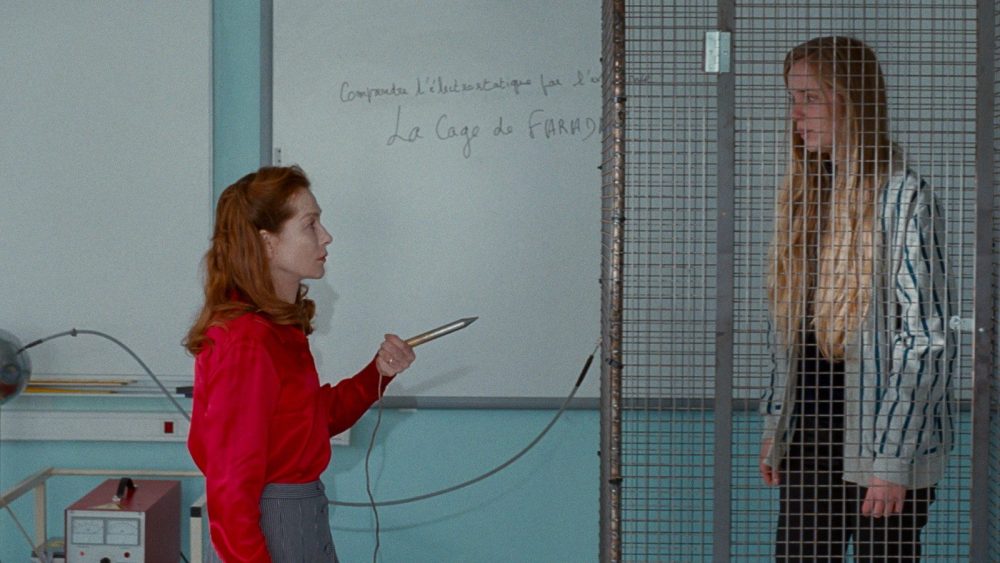A new French feature ‘Mrs. Hyde’ has its North American premiere at NYFF 2017.
Serge Bozon’s rather odd, interesting, idiosyncratic, and unpredictable comic thriller, Mrs. Hyde, is loosely inspired by Robert Louis Stevenson’s famous ‘Jekyll and Hyde’ narrative—but this time the split protagonist is not a man, but a middle-aged woman, played by internationally-acclaimed French actor and icon, Isabelle Huppert.
Huppert plays Mrs. Géquil (sounds like Jekyll), a timid and ineffectual high school science teacher who is mocked and reviled by her students—and even the school principal. Her life is a battle to maintain control over her chaotic classroom, haplessly negotiate school politics, and enjoy brief retreats into domestic life with her devoted stay-at-home husband.
One night, during a lightning storm—and while a harvest moon rises outside—Mrs. Géquil accidentally electrocutes herself while working in her makeshift science laboratory. The occurrence transforms her into someone else: not a grotesque monster with a dark side, but a conductor of fiery electrical currents that incinerate those who come too close.
As Mrs. Hyde, she glows and sleepwalks at night, leaving behind an incendiary trail of mystery and destruction in her suburban neighborhood. But by day, under Mrs. Hyde’s influence, Mrs. Géquil is a more decisive, effective teacher, able to communicate with Malik, the disruptive disabled student who has been making her life hell in the classroom.
Madame gives Malik a key to her lab and mentors him, teaching him how to think and problem-solve so that he might escape the cycle of disadvantage that threatens to further handicap him, like the dead-end teenage boys of the surrounding housing estates.
Mrs. Hyde is a fitting vehicle for the esteemed Huppert who starred in last year’s NYFF hit Elle. That film, also an unconventional French feature, garnered her an Oscar nomination for Best Actress—which she should have won.
And, as with that controversial film, Huppert again commits to the experimental notion that roles for female actors should be challenging, complex, not necessarily likable—and not fit neatly into Hollywood stereotypes.
Huppert’s Géquil-Hyde portrayal is not a simple dichotomy, and she never really becomes a superhero or a Hulk, either. Rather, her character’s dual nature is used to examine and dissect tensions around gender, race, and age in contemporary France—notably in a sketchy Paris suburb dominated by multi-ethnic estates and sexist education department bureaucracy.
Director Bozon is not a Hollywood wunderkind directing by numbers. He is a cineaste who, like his French New Wave forebears, spent time as a film critic. Ideas—especially that of “writing” with cinema—drive his narratives as much as plot mechanics.
Be prepared to go to unexpected places with Mrs. Hyde. If you don’t enjoy the experimental and philosophical aspects of French cinema—where references to Rimbaud are just par for the course—you probably won’t enjoy Mrs. Hyde, which defies the narrative conventions of commercial American cinema.
But you can count on the flame-haired Huppert to deliver an incandescent, intimate, and literally incendiary perspective on what a woman can be. In Mrs. Hyde she embodies a female character we almost never see: complex, aging, and faced with a crisis in her powers—or perhaps the discovery of them.
Mrs. Géquil’s alchemical apotheosis devastates the men around her, terrifies the female students who have admonished her for not working hard enough, and seems to pose the question: truthfully, what kind of power are any of us really comfortable relinquishing to women, and what might happen if this power were to be unleashed?
FESTIVAL SCREENINGS OF MRS. HYDE:
FRIDAY, SEPTEMBER 29 AT 6:00 PM (With Q&A)
Alice Tully Hall
SUNDAY, OCTOBER 1, AT 12:30 PM (With Q&A)
Walter Reade Theater
